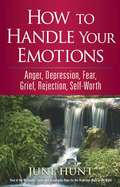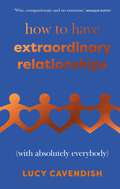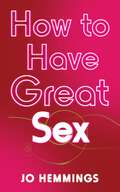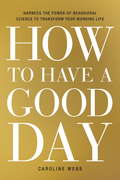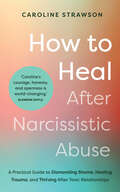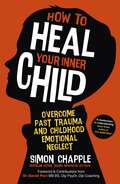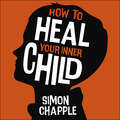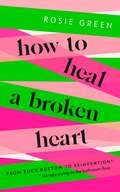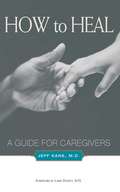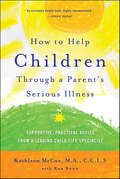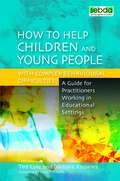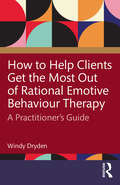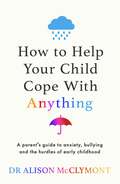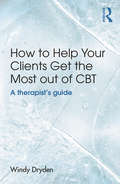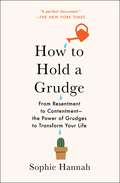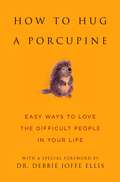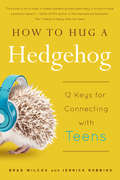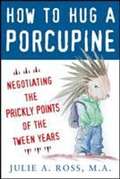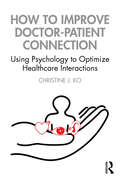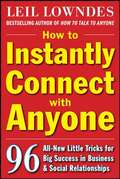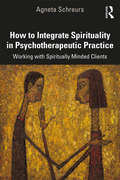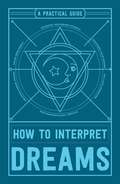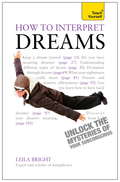- Table View
- List View
How to Handle Your Emotions: Anger, Depression, Fear, Grief, Rejection, Self-worth
by June HuntThe first of an exciting new series of topical counseling resources offering God's truth for today's problems! Every person struggles with the common emotions related to anger, depression, fear, rejection, self-worth. How can we prevent negative emotions from getting the best of us? Longtime biblical counselor June Hunt looks to the Bible for the answers, offering compassionate guidance that encourages the heart and offers hope for even the most difficult situations. Each of the above topics is explored in four parts, examining the definitions, the characteristics, the causes, and the solutions that enable us to handle our emotions in ways that honor God and bless the people around us. At every step of the way, valuable insights are gleaned from Scripture. Written with a strong emphasis on practical applications that make a lasting difference, this guide is perfect for use by individuals, friends, small groups, and ministry workers.
How to Have Extraordinary Relationships: (With Absolutely Everybody)
by Lucy Cavendish‘Wise, compassionate and no-nonsense.’ – Monique RoffeyHow would you feel if all the key relationships in your life were not just good, but extraordinary? Why simply survive when you could flourish? We all get stuck in certain behaviour patterns, or may find ourselves dissatisfied with our relationships - whether they're with our co-workers, friends, siblings or partners. Yet small fixes are right there at our fingertips and can make a huge difference to our happiness and wellbeing. Each chapter of How to Have Extraordinary Relationships covers one of therapist and coach Lucy Cavendish’s seven key tips for improving our relationships: Active listening Empathy Change the narrative Healing yourself You are responsible for all your relationships You have choices – make different choices Be rigorous about where you put your energies Using case studies and her own professional experience, Lucy offers examples, inspiration and clear, actionable advice to create a guide for anyone who wants to develop their communication skills, improve their relationships and reconnect with the crucial people in their lives.
How to Have Great Sex
by Jo HemmingsWhen you want to buy or rent your dream home, you go to an estate agent. When you want to learn to cook, you buy a recipe book from TV's latest celebrity chef. But who is there for you when you want to learn about having great sex? Or when you want to revive a flagging sex life? How to Have Great Sex is the answer. This step-by-step guide takes you from the underrated pleasures of a good snog through to the best positions for having that quickie in a forbidden place and gives you all the advice you need on:- How to initiate sex- How to talk dirty- How to give and get great oral sex- How to enjoy casual, safe sex - How to make love to the same partner for the rest of your lifeWhether you are a novice wanting to move on from the basics of the missionary position, or an experienced lover aching to know how to pep up your sex life, you'll find it all explained between these sheets in explicit, intimate, fun and supersexy detail.
How to Have a Good Day: Harness the Power of Behavioral Science to Transform Your Working Life
by Caroline WebbIn How to Have a Good Day, economist and former McKinsey partner Caroline Webb shows readers how to use recent findings from behavioral economics, psychology, and neuroscience to transform our approach to everyday working life. Advances in these behavioral sciences are giving us ever better understanding of how our brains work, why we make the choices we do, and what it takes for us to be at our best. But it has not always been easy to see how to apply these insights in the real world - until now. In How to Have a Good Day, Webb explains exactly how to apply this science to our daily tasks and routines. She translates three big scientific ideas into step-by-step guidance that shows us how to set better priorities, make our time go further, ace every interaction, be our smartest selves, strengthen our personal impact, be resilient to setbacks, and boost our energy and enjoyment. Through it all, Webb teaches us how to navigate the typical challenges of modern workplaces--from conflict with colleagues to dull meetings and overflowing inboxes--with skill and ease. Filled with stories of people who have used Webb's insights to boost their job satisfaction and performance at work, How to Have a Good Day is the book so many people wanted when they finished Nudge, Blink and Thinking Fast and Slow and were looking for practical ways to apply this fascinating science to their own lives and careers. A remarkable and much-needed book, How to Have a Good Day gives us the tools we need to have a lifetime of good days.From the Hardcover edition.
How to Heal After Narcissistic Abuse: A Practical Guide to Dismantling Shame, Healing Trauma, and Thriving After Toxic Relationships
by Caroline StrawsonI believe you. I hear you. I see you. And I'm here to help you find your power to heal and thrive, not just survive.Somatic trauma therapist and positive psychology coach Caroline Strawson wants to show you that your past is not your life sentence. No matter what&’s happened in your life, you can find joy, light, and happiness again.Integrating her own lived experience of narcissistic abuse with trauma-informed practices and positive psychology interventions, this book will help you heal and begin to feel like yourself again. You will learn:· to understand your core emotional wounds and begin to heal from your past· practical tools and exercises for engaging with the impact of narcissistic abuse, such as nervous system regulation, internal family systems theory, and the SELF Navigation Map· techniques to mitigate any potential triggers and develop compassion and kindness towards your inner child, such as grounding practices, somatic self-leadership, and meditations· how to turn pain into purpose, moving to a place of post-traumatic growthThis book will show you that you have the power to change the way you think and feel about the abuse that has happened to you, not because of you, and finally live the life you deserve to live – free from guilt and shame.It&’s time to take action. To do things differently. To step into your true self. To heal.
How to Heal Your Inner Child: Overcome Past Trauma and Childhood Emotional Neglect
by Simon Chapple'A masterclass in understanding' ANNIE GRACE, author of This Naked MindTen questions to ask yourself, right now:* Do you have a sense that something is wrong, but you don't know what it is?* Do you have a feeling that you are hollow inside, that you are empty or have a void within?* Do you react badly to rejection?* Do you often feel sad, unhappy or down for no obvious reason?* Would you describe yourself as highly sensitive?* Do you have problems with relationships and intimacy?* Do you engage in addictive behaviour - alcohol, drugs, gambling, shopping, food, sex, work, exercise?* Do you have low self-esteem or self-worth - are you not 'good enough'?* Do you have a sense of being numb to your feelings?* Do you rarely experience true joy and happiness?If you have answered 'yes' to most of these questions, there is a strong chance you have experienced emotional neglect or trauma as a child. An emotionally neglected child may struggle to form strong and secure attachments as an adult. They may feel hollow or empty, worthless (or overly important), judge themselves harshly and struggle with addictive tendencies - drinking, eating or exercising too much, for example. If this describes you, Heal Your Inner Child will change your life and give you back the love, compassion and authenticity you needed as a child, and deserve as an adult.Fomer heavy drinker turned sobriety coach Simon Chapple is - like you - a survivor of childhood trauma. His unique brand of straight-talking, practical yet reflective and relatable advice has helped thousands of people quit drinking, and he can help you now to move on from childhood emotional neglect to a place of happiness free from past trauma. How to Heal Your Inner Child is a stepped and safe approach to confronting your past, with space for reflective and supportive strategies that will help you to foster self-compassion and break free from the destructive behaviours that have blighted your life. Clinically endorsed and verified by a psychotherapist, this deeply personal, unflinchingly honest exploration is designed to unlock your own epiphany and support you as you journey to a happier, less troubled and more authentic self.
How to Heal Your Inner Child: Overcome Past Trauma and Childhood Emotional Neglect
by Simon Chapple'A masterclass in understanding' ANNIE GRACE, author of This Naked MindTen questions to ask yourself, right now:* Do you have a sense that something is wrong, but you don't know what it is?* Do you have a feeling that you are hollow inside, that you are empty or have a void within?* Do you react badly to rejection?* Do you often feel sad, unhappy or down for no obvious reason?* Would you describe yourself as highly sensitive?* Do you have problems with relationships and intimacy?* Do you engage in addictive behaviour - alcohol, drugs, gambling, shopping, food, sex, work, exercise?* Do you have low self-esteem or self-worth - are you not 'good enough'?* Do you have a sense of being numb to your feelings?* Do you rarely experience true joy and happiness?If you have answered 'yes' to most of these questions, there is a strong chance you have experienced emotional neglect or trauma as a child. An emotionally neglected child may struggle to form strong and secure attachments as an adult. They may feel hollow or empty, worthless (or overly important), judge themselves harshly and struggle with addictive tendencies - drinking, eating or exercising too much, for example. If this describes you, Heal Your Inner Child will change your life and give you back the love, compassion and authenticity you needed as a child, and deserve as an adult.Fomer heavy drinker turned sobriety coach Simon Chapple is - like you - a survivor of childhood trauma. His unique brand of straight-talking, practical yet reflective and relatable advice has helped thousands of people quit drinking, and he can help you now to move on from childhood emotional neglect to a place of happiness free from past trauma. How to Heal Your Inner Child is a stepped and safe approach to confronting your past, with space for reflective and supportive strategies that will help you to foster self-compassion and break free from the destructive behaviours that have blighted your life. Clinically endorsed and verified by a psychotherapist, this deeply personal, unflinchingly honest exploration is designed to unlock your own epiphany and support you as you journey to a happier, less troubled and more authentic self.
How to Heal Your Inner Child: Overcome Past Trauma and Childhood Emotional Neglect
by Simon Chapple'A masterclass in understanding' ANNIE GRACE, author of This Naked Mind: Control Alcohol, Find Freedom, Discover Happiness and Change Your LifeA recovery and growth handbook for anyone who feels empty - but doesn't know why.Ten questions to ask yourself, right now:* Do you have a sense that something is wrong, but you don't know what it is?* Do you have a feeling that you are hollow inside, that you are empty or have a void within?* Do you react badly to rejection?* Do you often feel sad, unhappy or down for no obvious reason?* Would you describe yourself as highly sensitive?* Do you have problems with relationships and intimacy?* Do you engage in addictive behaviour - alcohol, drugs, gambling, shopping, food, sex, work, exercise?* Do you have low self-esteem or self-worth - are you not 'good enough'?* Do you have a sense of being numb to your feelings?* Do you rarely experience true joy and happiness?If you have answered 'yes' to most of these questions, there is a strong chance you have experienced emotional neglect or trauma as a child. An emotionally neglected child may struggle to form strong and secure attachments as an adult. They may feel hollow or empty, worthless (or overly important), judge themselves harshly and struggle with addictive tendencies - drinking, eating or exercising too much, for example. If this describes you, Heal Your Inner Child will change your life and give you back the love, compassion and authenticity you needed as a child, and deserve as an adult.Fomer heavy drinker turned sobriety coach Simon Chapple is - like you - a survivor of childhood trauma. His unique brand of straight-talking, practical yet reflective and relatable advice has helped thousands of people quit drinking, and he can help you now to move on from childhood emotional neglect to a place of happiness free from past trauma. How to Heal Your Inner Child is a stepped and safe approach to confronting your past, with space for reflective and supportive strategies that will help you to foster self-compassion and break free from the destructive behaviours that have blighted your life. Clinically endorsed and verified by a psychotherapist, this deeply personal, unflinchingly honest exploration is designed to unlock your own epiphany and support you as you journey to a happier, less troubled and more authentic self.(P) 2021 Hodder & Stoughton Limited
How to Heal a Broken Heart: From Rock Bottom to Reinvention (via ugly crying on the bathroom floor)
by Rosie Green'The poster girl for divorce.' The Times'If you've ever had your heart broken (and who hasn't) Rosie Green's How to Heal a Broken Heart is your best friend. Honest, comforting and hopeful.' MARIAN KEYES'I love Rosie Green's writing.' ELIZABETH DAY'Brilliant. One of the few books that I've found that really describes what a broken heart feels like. It touched so many nerves.' VANESSA FELTZ'It reduced me to tears.' EMMA BARNETT, Woman's Hour, BBC Radio 4'It wasn't a conscious uncoupling. I had my heart ripped out and stamped on.'When Rosie Green's husband walked out after 26 years together, he declined to leave a forwarding address. Instead, he left a devastated woman who turned into someone she barely recognised: unable to eat or sleep, and so desperate to keep her family together she'd sacrifice her sense of self - and her dignity.She thought she'd never get over it. But she did. And so can you. This is the frank, uplifting and insightful book Rosie wished she could have found when her whole world fell apart. Here's your guide to getting through it - with advice from the experts, with the help of your friends, with a deliciously dark sense of humour and, for Rosie, with some highly inappropriate sex advice from her pre-teen daughter. Let her brilliantly honest handbook show how you can heal faster, understand yourself better and move on.How to Heal a Broken Heart doesn't sugarcoat it - heartbreak brings you to your knees. But, sometimes, it also gives you a necessary shove towards a happier, more fulfilled life than you ever dreamed was possible.
How to Heal: A Guide for Caregivers
by Jeff KaneThe ability to heal is not reserved for a gifted few. Anyone aching to ease the suffering of a sick friend or loved one can learn to become unconditionally present to the sick person rather than to the disease. Through stories filled with compassion, wisdom, and gentle humor, Dr. Jeff Kane shows readers how to use mindful attention, therapeutic listening, and truthful speech to help others heal.
How to Help Children Through a Parent's Serious Illness: Supportive, Practical Advice from a Leading Child Life Specialist
by Kathleen McCue Ron BonnHow to Help Children Through a Parent's Serious Illness has become the standard work on an important subject. A classic for over fifteen years, it continues to be a go-to book for supportive, practical advice, based on the lifetime experience and clinical practice of one of America 's leading child life practitioners.Fully revised and updated, this new edition also explores the major issues and developments from the last decade that affect children today, including the dangers and opportunities of the Internet, a deeper understanding of how hereditary diseases affect children, the impact of the nation's explosive growth in single-parent families, and new insights into how family trauma and a parent's mental illness may affect children.
How to Help Children and Young People with Complex Behavioural Difficulties
by Ted Cole Barbara Knowlesxx
How to Help Clients Get the Most Out of Rational Emotive Behaviour Therapy: A Practitioner’s Guide
by Windy DrydenThis book aims to assist therapists in helping their clients decide if Rational Emotive Behaviour Therapy (REBT) is for them and, if so, how to get the most out of the model.It does not seek to equip therapists with the particular REBT skills presented in training courses and skills-oriented books but rather strives to help therapists and their clients to be aware of and deal productively with more general issues that pertain to the effective practice of REBT. Topics covered include: Helping clients decide if REBT is for them. Helping clients prepare for their REBT sessions. Helping clients understand the process of change in REBT. Helping clients apply what they learn from REBT sessions. Helping clients become their own REBT therapist. This book is designed for all REBT therapists, whether experienced or in training.
How to Help Your Child Cope With Anything: The must-have guide to parenting resilient children
by Dr Alison McClymontFrom accredited child psychologist, Dr Alison McClymont, comes a book that bridges the gap between complex psychology and straightforward parenting advice.No parent can guard against everything but parental knowledge is power when it comes to the emotional development of your child, setting the solid foundation for every life interaction thereafter. Rooted in the latest science and explained very simply, this is a pioneering and accessible book that is a must-have guide for all parents who want to raise emotionally resilient children and teach them how to have a health relationship with their emotions.In How to Help Your Child Cope With Anything, Dr Alison McClymont delivers deep wisdom and unrivalled insights, drawing on revolutionary research and her extensive experience working directly with thousands of children. This book, packed with actionable takeaways and guide activities, will help you and your child to navigate experiences of bullying, grief, separation, anxiety, divorce, moving house and so much more.
How to Help Your Child Cope With Anything: The must-have guide to parenting resilient children
by Dr Alison McClymontFrom accredited child psychologist, Dr Alison McClymont, comes a book that bridges the gap between complex psychology and straightforward parenting advice.No parent can guard against everything but parental knowledge is power when it comes to the emotional development of your child, setting the solid foundation for every life interaction thereafter. Rooted in the latest science and explained very simply, this is a pioneering and accessible book that is a must-have guide for all parents who want to raise emotionally resilient children and teach them how to have a health relationship with their emotions.In How to Help Your Child Cope With Anything, Dr Alison McClymont delivers deep wisdom and unrivalled insights, drawing on revolutionary research and her extensive experience working directly with thousands of children. This book, packed with actionable takeaways and guide activities, will help you and your child to navigate experiences of bullying, grief, separation, anxiety, divorce, moving house and so much more.
How to Help Your Clients Get the Most Out of CBT: A therapist's guide
by Windy DrydenHow to Help Your Clients Get the Most Out of CBT: A therapist's guide is a practical guide, which will show therapists, both experienced and novice, how to assist clients and help them decide whether CBT is suitable for them and, if so, to help them get the most out of therapy. Rather than concentrating on skills, the book covers the realities of practice, with chapters on how to make therapeutic agreements with the client, helping clients prepare for sessions, and how to deal with lack of therapeutic progress should that occur. The book can be used in conjunction with a book for clients, How to Get the Most Out of CBT: A client’s guide, which is written for those considering using or already consulting a cognitive behaviour therapist. This concise and highly practical book will be an invaluable resource to Cognitive Behaviour Therapists in practice and training.
How to Hold a Grudge: From Resentment to Contentment—The Power of Grudges to Transform Your Life
by Sophie HannahThe first and only comprehensive examination of the universal but widely misunderstood practice of grudge-holding that will show you how to use grudges to be your happiest, most optimistic, and most forgiving self. Secretly, we all hold grudges, but most of us probably think we shouldn’t, and many of us deny that we do. To bear a grudge is too negative, right? Shouldn’t we just forgive and move on? Wrong, says self-appointed grudge guru Sophie Hannah, in her groundbreaking and irreverent self-help guide. Yes, it’s essential to think positively if we want to live happy lives, but even more crucial is how we get to the positive. Denying our negative emotions and experiences is likely to lead only to more pain, conflict, and stress. What if our grudges are good for us? What if we could embrace them, and use them to help ourselves and others, instead of feeling ashamed of our inability to banish negative emotions and memories from our lives? With contributions from expert psychotherapists as well as extracts from her own extensive catalog of grudges, Sophie Hannah investigates the psychological origins of grudges and also offers not-so-obvious insights into how we should acknowledge—and embrace—them in order to improve the quality of our interpersonal relationships and senses of self. Grudges do not have to fill us with hate or make us toxic, bitter, and miserable. If we approach the practice of grudge-holding in an enlightened way, it will do the opposite—we will become more forgiving. Practical, compassionate, and downright funny, How to Hold a Grudge reveals everything we need to know about the many different forms of grudge, the difference between a grudge and not-a-grudge (not as obvious as it seems), when we should let a grudge go, and how to honor a grudge and distill lessons from it that will turn us into better, happier people—for our own benefit and for the sake of spreading good and limiting harm in the world.
How to Hug A Porcupine
by June Eding Dr Debbie Joffe EllisHow to Love the Difficult People in Your LifeMost of us know someone who, for whatever reason, always seems to cause problems, irritate others, or incite conflict. Often, these people are a part of our daily lives. The truth is that these trouble makers haven't necessarily asked to be this way. Sometimes we need to learn new approaches to deal with people who are harder to get along with or love.How to Hug a Porcupine: Easy Ways to Love Difficult People in Your Life, explains that making peace with others isn't as tough or terrible as we think it is-especially when you can use an adorable animal analogy and apply it to real-life problems.How to Hug a Porcupine provides tips for calming the quills of parents, children, siblings, strangers, and other prickly people you may encounter. Among other tips, How to Hug a Porcupine includes: *Three easy ways to end an argument*How to spot the porcupine in others *How to spot the porcupine in ourselvesWith a foreword by noted psychotherapist Dr. Debbie Ellis, widow of Dr. Albert Ellis, How to Hug a Porcupine is a truly special book.
How to Hug a Hedgehog: 12 Keys for Connecting with Teens
by Brad Wilcox Jerrick Robbins&“This book is packed with real world experiences and heartwarming stories that will help your family envision a happier tomorrow.&” —Brandon Mull, #1 New York Times–bestselling author A teen&’s job is to be difficult and most do it really, really well. But what about you? You want to hug that hedgehog, right? But you don&’t want to get hurt. No problem. With entertaining stories and 12 principles that open the cages, unlock the doors, gently tear down those walls, and get you talking, How to Hug a Hedgehog explores everything from communication to what you might have missed on the teen &“warning label.&” Wilcox and Robbins help you face your worst fears, effectively handle pressure and stress, and answer the hardest question of all: &“What happens if I fail?&” &“This book is full of hope. It makes something hard seem easy. It is sure to have a positive impact!&” —Sean Covey, author of the international bestseller The 7 Habits of Highly Effective Teens &“How to Hug a Hedgehog is relevant, timely and essential for anyone wanting to build positive relationships with teenagers. This book will enrich and transform lives forever.&” —Richie Norton, bestselling author of The Power of Starting Something Stupid&“This book will make a difference. The suggestions are doable and will totally change the way you interact with teens.&” —Mark Henshaw, author of Red Cell
How to Hug a Porcupine: Negotiating the Prickly Points of the Tween Years
by Julie A. RossYesterday, your child was a sweet, well-adjusted eight-year-old. Today, a moody, disrespectful twelve-year-old. What happened? And more important, how do you handle it? How you respond to these whirlwind changes will not only affect your child's behavior now but will determine how he or she turns out later. Julie A. Ross, executive director of Parenting Horizons, shows you exactly what's going on with your child and provides all the tools you need to correctly handle even the prickliest tween porcupine. Find out how other parents survived nightmarish tween behavior--and still raised great kids Break the “nagging cycle,” give your kids responsibilities, and get results Talk about sex, drugs, and alcohol so your kid will listen Discover the secret that will help your child to disregard peer pressure and make smart choices--for life
How to Improve Doctor-Patient Connection: Using Psychology to Optimize Healthcare Interactions
by Christine J. KoHow to Improve Doctor-Patient Connection offers actionable steps for improving communication between health professionals and patients based on visual, auditory, and emotional understanding from the principles of cognitive psychology. Drawing on the author’s personal experience as both a healthcare professional and a mother of two children, How to Improve Doctor-Patient Connection explores communication between doctors and patients as well as bias in healthcare. This how-to text includes several practical applications that can be applied to healthcare encounters, enabling readers to form habits based on visual analysis of body language, auditory information from language and tone of voice, and logical emotion perception that will allow for improved doctor-patient connection. By integrating the perspectives of both doctors and patients and applying a psychological lens, this text is invaluable to healthcare practitioners, students of medicine, healthcare, biology, and related fields, and anyone looking to improve their own or other’s quality of doctor-patient interactions and overall healthcare experience.
How to Instantly Connect with Anyone: 96 All-new Little Tricks for Big Success in Relationships
by Leil LowndesHow to connect with anyone gives you 96 tips on how to do just that!
How to Integrate Spirituality in Psychotherapeutic Practice: Working with Spiritually-Minded Clients
by Agneta SchreursHow to Integrate Spirituality in Psychotherapeutic Practice: Working with Spiritually Minded Clients enables mental health professionals to acquire the skills they need to diagnose and treat religious or spiritually minded clients. Research and practical experience show that religion and spirituality of clients can be very important in psychotherapy. Given the great diversity in the area of religion and spirituality, it is not easy to understand the complicated interconnections between the psychological complaints and the spirituality and/or religion of a client. By providing an understanding of various types of spirituality, as well as theory, case histories, and clinical information using DSM diagnoses, this book will help therapists to design effective interventions. It takes account of the plurality in psychotherapeutic methods, as well as in spiritual/religious views, practices, and use of terms. How to Integrate Spirituality in Psychotherapeutic Practice is directed to a readership of practitioners who have decided to integrate the religious/spiritual dimension into their practice. It primarily addresses psychotherapists and mental health counsellors practising in general mental health residential units and day-to-day consultation clinics, as well as religious therapists, pastoral psychotherapists, pastoral counsellors, and the clergy.
How to Interpret Dreams: A Practical Guide
by Adams MediaLearn how to decipher the meanings behind your dreams with this engaging new guide.Everyone dreams. But how do we know what our dreams mean? How to Interpret Dreams will show you how to remember your dreams and understand them. It includes simple instructions to help analyze dreams and a dictionary of symbols so you&’ll know what all those colors, feelings, objects, and places that pop up in your dreams actually mean. The brain does some of its most fascinating work while it&’s at rest. This book can show you what you&’ve been missing.
How to Interpret Dreams: Teach Yourself
by Leila BrightWhat do our dreams mean? Throughout recorded history this question has fascinated people all over the world. How to Interpret Dreams is a complete handbook - simple, practical and easy to use - which suggests a host of possible answers. Dreams can serve as guides to your inner self and to your relationships, health and career success.How to Interpret Dreams explains how you can benefit from the power of dreams by:- Recalling dreams vividly and distinguishing significant from insignificant dreams.- Learning to work with symbols to gain insight into the messages hidden in dreams.- Appreciating the role played by specific types of dream - prophetic, anxiety, sexual etc.- Harnessing the power of lucid and mutual dreaming.- Learning to generate dreams to help solve specific problems.It includes case studies and sample entries from dream diaries as well as a comprehensive, quick-reference A to Z of the meaning of symbols - from abyss to zoo, fog to sunshine and bereavement to birth, plus hundreds of others in between.
